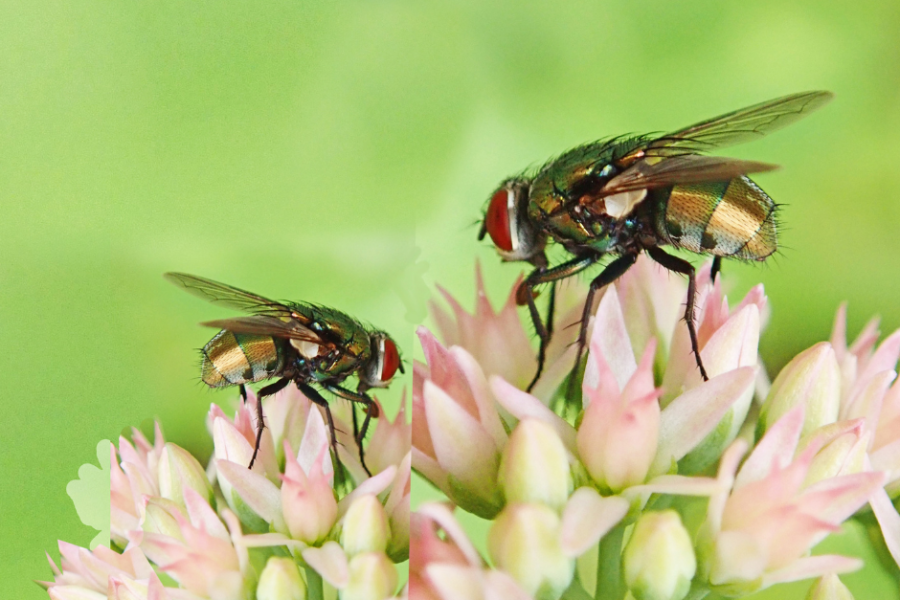
Flies in your Virginia home are clearly pests. But did you know of the dangers that come with spotting that one pesky fly?
House flies can carry disease-causing bacteria and even parasites!
Beyond the aggravating buzzing and failed swatting attempts, having flies in your Virginia home can be a threat to your family’s health. Not to worry, there are several simple ways you can prevent and get rid of these dangerous pests. James River Pest Solutions has the tools and knowledge to help!
Let’s start with understanding who these little buggers are.
Life Cycle of Flies in Your Virginia Home
Flies have multiple life stages that you and your family can easily recognize. To effectively identify an infestation in your home, it is essential to be aware of each phase. Whether it be an adult fly or freshly hatched larva, a fly at any life stage is a potential danger. It only takes the right resources to allow it to grow and reproduce.
The lifecycle of a fly starts with an egg. Fly eggs are tiny with white coloring and an oval-like shape. You’ll find them in clusters on decaying fruits and vegetables or other rotting, moist organic matter. Eggs can hatch within hours, and larva emerge.
Before encountering the adult fly, you may spot fly eggs or their cream-colored and legless larva. After three days to several weeks of feeding, it hides and enters the pupa stage identified by a small capsule-like case. Here is where transformation to the adult stage occurs. After several days, an adult fly emerges.
The total life cycle of the typical house fly lasts about three months. A female will lay eggs about five times in groups of over 100 eggs.
Dangers of Flies in Your Virginia Home
Flies can carry bacteria and microorganisms that cause illness to humans or pets in the home. Take, for example, the common housefly. It might feed on a pile of animal dung covered in harmful bacteria and potential parasites. Then it finds its way into your kitchen, contaminating the surfaces and laying its eggs in your exposed trash or food.
It’s hard to believe the flies in your Virginia home could be carrying any of the thirty different bacterial diseases and parasites. When spread to humans, significant illnesses can occur.
Illnesses and diseases spread by house flies include, but are not limited to, the following:
- Food poisoning
- Typhoid fever
- Diarrhea
- Dysentery
- Tuberculosis
- Parasitic worms
Because flies can be such a threat to you and your family’s health, being able to identify these pests and know what you’re dealing with can save you from serious health issues in your home.
Spotting Flies in Your Virginia Home
Flies that typically infest homes are known as “filth flies.” Not all filth flies pose a threat to you and your family’s health, but the common housefly is not the only one to carry harmful bacteria and parasitic worms.
Filth flies are divided into two groups by size- small and large. Identifying the common flies in your Virginia home will aid in knowing how to handle and prevent an infestation.
Small Filth Flies
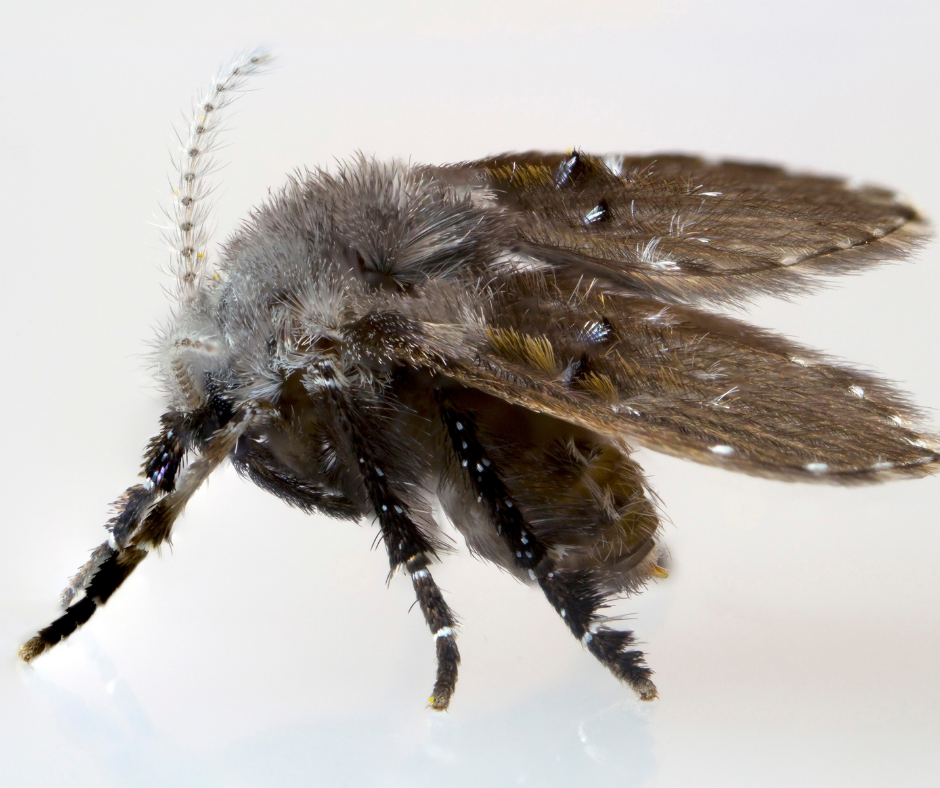
Drain Fly
Drain flies are small flies, often mistaken for moths. They are black or gray and covered in fuzzy hair. Because of their large horizontal wings, you’ll often see them flying in chaotic short bursts. Drain flies gather near water sources in your home, including drains. Hence, their name.
Because the drain fly does not carry any known diseases, it isn’t usually a risk to human health. Though, it is a pest in the home.
Drain Fly Elimination and Prevention
If you find drain flies in your Virginia home, there is likely debris build-up in the drains and other damp indoor areas. It’s even possible that organic debris has built up in places outside your home, like a nearby sewer.
Regularly clearing the gunk and eliminating the moisture in damp indoor areas can help to prevent these pests from being attracted to your home. It can be challenging to determine precisely where they are coming from with the various possible entrances the structure may have for drain flies. It’s best to call the professionals if you begin to see drain flies buzzing about your kitchen or bathroom.
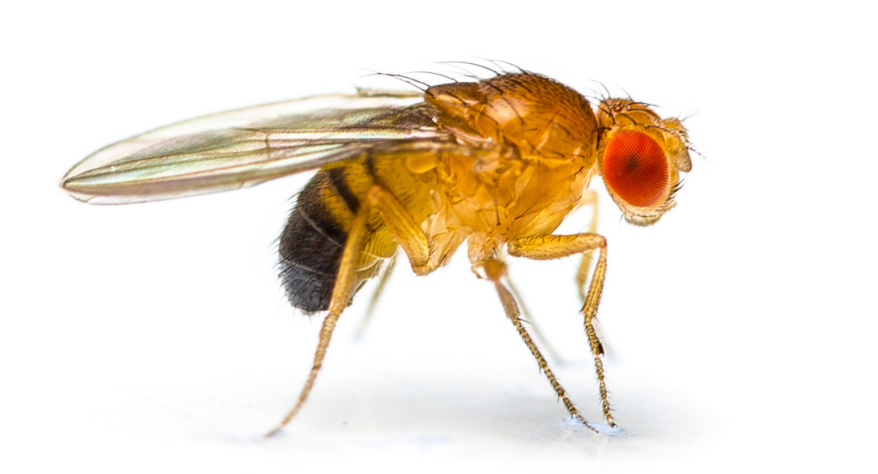
Fruit Fly
Fruit flies are small black and tan flies known for their distinctive bright red eyes. You’ll spot them near or on exposed ripening or rotting fruits and vegetables. Newly bought produce may be infested with fruit flies. Not checking for infestation before bringing fruits and vegetables inside is one way it can enter your home. The other is simply flying through an open door or window.
Fruit flies are less of a health concern than the common house fly, but they still have the potential to contaminate your food and surfaces. In most cases, though, they are just a bother.
Fruit Fly Elimination and Prevention
If you’re spotting fruit flies in your Virginia home, quickly eliminate any fruits or vegetables that are exposed. Fruit flies not only feed on ripening or rotting produce, but it is also their place for breeding and laying their eggs. On your next trip to the store, inspect your selections for any evidence of infestation. At home, immediately store them in the fridge or a sealed container.
Although preventable, fruit flies lay many eggs very quickly and prove challenging to eliminate. Once you’ve thrown out the possible sources, give the professionals a call.
Large Filth Flies
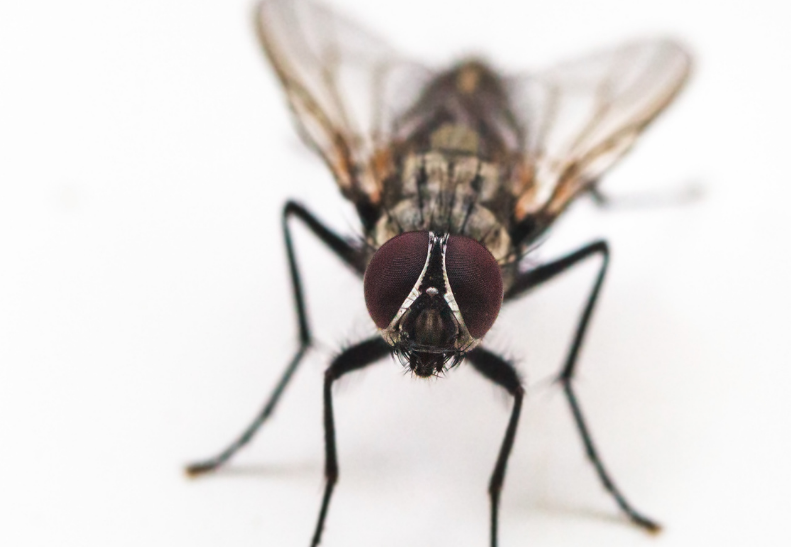
Common Housefly
The flies buzzing around in your kitchen or living room are more than likely common house flies. Most people are familiar with these pests. The body is gray in color and oval-shaped.
The common housefly is not merely a pest but a potential danger in your home. Animal dung, open water sources, traces of sugar and grease, and even human sweat attract these pests. Not only are these sources of food, but they are also perfect locations for the common housefly to breed and lay its eggs. It’s no wonder these insects have found a home in human settlements.
Common Housefly Elimination and Prevention
Houseflies are often present in your home because of unsealed or overflowing trash indoors or even around the structure. Keeping your trash from building up and keeping doors and windows sealed helps prevent the common housefly from entering your home.
When it comes to handling a housefly infestation, it is best to bring in the pros. Like all flies, they rapidly reproduce, and finding where they enter a home is tricky business.
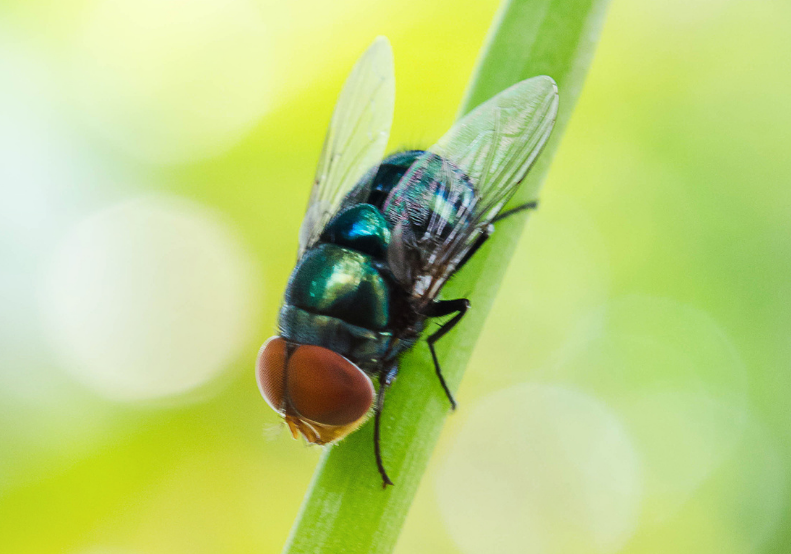
Cluster Fly
Cluster flies are slightly larger than the common housefly. They are a dull gray and have tiny yellow hairs covering some of their body and legs. They need warmth during the cooler months and hide in hard-to-reach places, like crawl spaces and attics or even in the walls. Once temperatures warm up, you may find them gathered in the corner of a window attempting to escape your home.
Cluster flies don’t typically interact with areas where dangerous bacteria can hitch a ride. The cluster fly may not be a threat to you and your family’s health, but they are a pest in your home.
Cluster Fly Elimination and Prevention
To prevent cluster flies from entering your home, be sure to keep windows and doors closed. They can enter your home in multiple ways, and they reproduce quickly. Calling up the professionals is your best option in getting cluster flies out of your home fast!
Preventing Flies in your Virginia Home
Knowing what kind of flies might be buzzing around your home and why they are there is crucial knowledge when it comes to discovering a fly on the kitchen counter. But how can you and your family prevent any fly from getting in, in the first place?
Flies in your Virginia home are attracted to many things. And although a dirty house is not always the culprit, the best way to prevent flies from entering and infesting your home is to keep it clean.
To prevent flies in your Virginia home, be sure you are keeping up with the following:
- All trash and food are in sealed containers.
- Trash bins are washed and sanitized regularly.
- Remove waste from inside and outside of your home as soon as possible.
- Pick up your pet’s feces immediately.
- Repair holes in window and door screens.
- Keep garden areas further away from home.
- Sanitize kitchen counters and sweep kitchen floors daily.
- Sanitize dining tables and sweep dining areas daily.
Sometimes, no matter how hard we try, pesky flies find their way into our homes.
If flies of any kind infest your home, call James River Pest Solutions today!